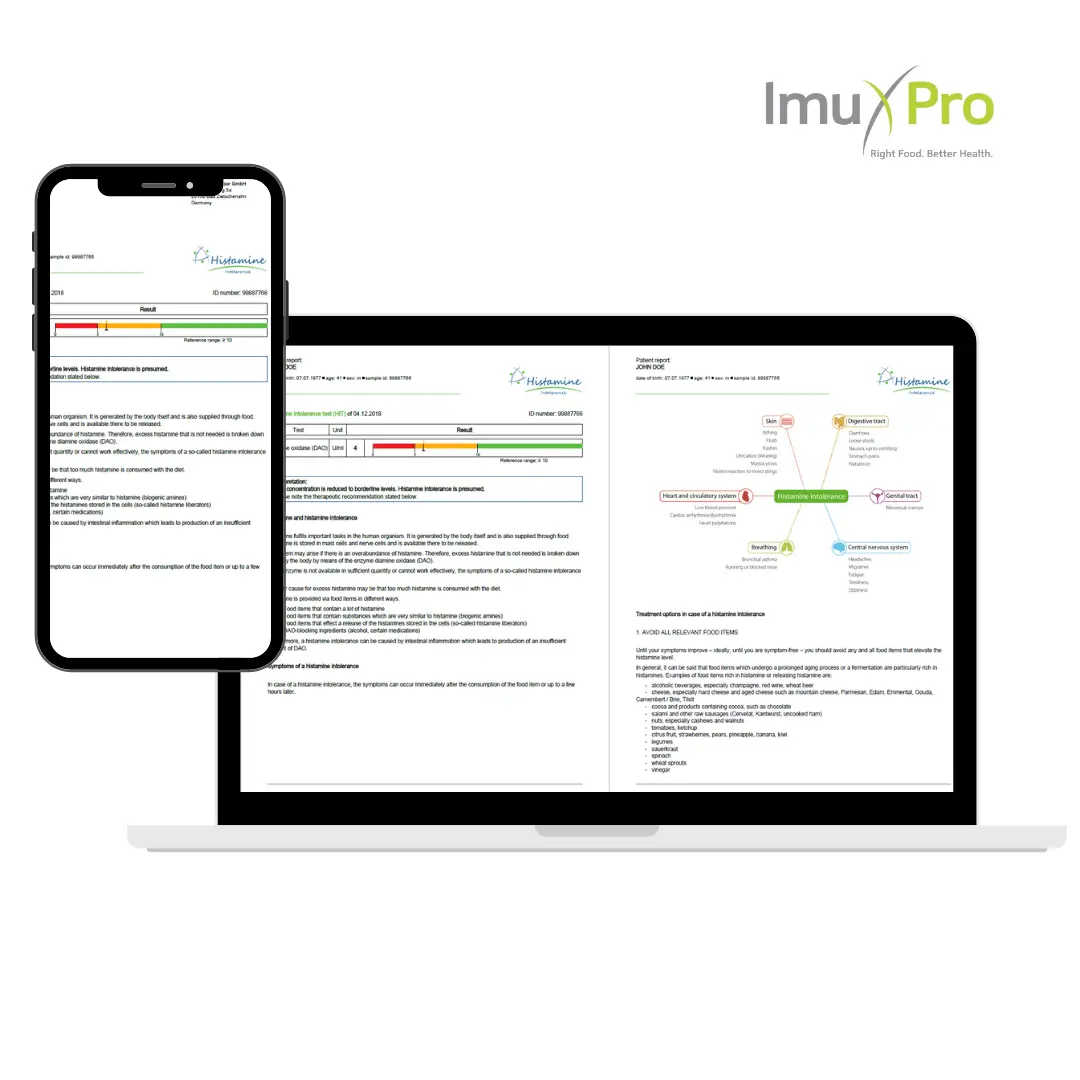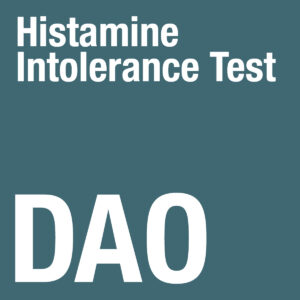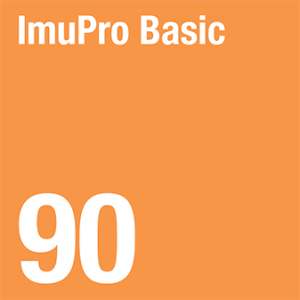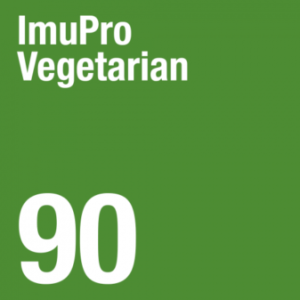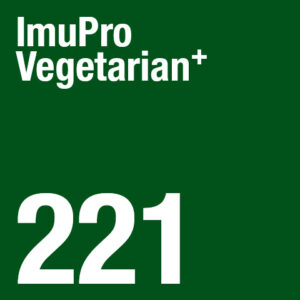ImuPro Bundle
$949.00
Accurate Trusted Results
Phone
Support
100% Secure Checkout
An accurate and reliable test bundle for IgG food allergies & histamine intolerance (DAO)
✔️ 10,000+ tests a year
✔️ Globally backed testing
✔️ 270 individual foods tested plus DAO enzyme activity
✔️ Accurate sample testing
The ImuPro Bundle give you both the ImuPro Complete 270 & the Histamine Intolerance test together in one product at a reduced price.
Access the most comprehensive and trusted IgG food allergy test in the world. This simple allergy test analyses 270 individual foods to identify specific delayed allergies (commonly called food intolerances) for unresolved chronic inflammatory symptoms like bloating, IBS, headache, joint pain, fatigue, skin conditions and difficulty losing weight.
Histamine intolerance can be caused by a deficiency or an inhibition of Diamine Oxidase (DAO), which is the enzyme responsible for the breaking down histamine in our gut. Histamine can lead to allergic-type reactions after consumption of certain foodstuffs.
ImuPro Complete 270 IgG Food Allergy Test
Identify the right food for better health with the Complete IgG food allergy test which examines 270 foods and additives, including IgG to Candida albicans. Alternatives to the most common foods are also tested so you can enjoy a wider variety of foods and peace of mind. Includes comprehensive coverage of herbs, spices, tea, coffee, sweeteners, plus thickening agents and preservatives
✔️ Used by GPs and clinicians in over 40 countries.
✔️ Conducted in specialised certified German labs.
✔️ Undertaken with medically validated ELISA test method.
✔️ Tested with blood serum for accuracy.
Right food, better health
270 individual foods are tested using a sophisticated and reliable blood analysis for IgG food allergies. Combined with our unique post-test guidance and nutritional guidelines, find the foods that are good for you and to pinpoint any individual ‘trigger foods’. By avoiding the foods that cause you problems, inflammatory processes can be reduced or even stopped, and your body is able to recover.
The comprehensive report contains accurate results and nutritional guidelines, which lead you through your change in diet. Also included are recipes, specifically tailored to your non-IgG reactive foods.
ImuPro nutritional guidelines contain 3 important steps:
Elimination phase
All foods with high levels of IgG antibodies are avoided during this phase so inflammatory processes can be reduced or stopped.
Provocation phase
To discover personal trigger foods, avoided foods are introduced back into your diet one by one. Only one new food at a time is reintroduced to determine if it’s responsible for your complaints.
Stabilisation phase
The trigger foods identified in the provocation phase are avoided for at least one year so the IgG antibodies can degrade and your body can recover. In some instances, there may be one or two foods that need to be avoided permanently.
Specific categories the ImuPro Complete 270 foods may help with:
Gastrointestinal
- Bloating
- Constipation
- Crohn’s disease
- Diarrhoea
- Irritable Bowel Syndrome (IBS)
- Nausea
Chronic Pain
- Headaches
- Migraines
- Joint pain
Excess Weight
- Chronic weight problems
- Difficulty losing weight
Skin Problems
- Atopic dermatitis-like skin problems
- Eczema
- Psoriasis
- Acne
Mood related symptoms
- Depression
- Anxiety
- Low energy and chronic fatigue
DAO (Histamine Intolerance) Test
Could your symptoms be related to problems with histamine? The symptoms of histamine intolerance can overlap with those of IgG food allergy.
What is histamine and histamine intolerance?
Histamine is a natural and important compound of the human body regulating blood pressure, the immune system and is involved in the nervous system. In general the body is able to balance the histamine release. In allergic reactions excessive release of histamine is responsible for the allergic symptoms. In this case anti-histamine may help to reduce the released of histamine. However, histamine is also present in high concentration in certain foods. Additional sources of histamine may be your gut flora, particularly when you have SIBO (small intestinal bacterial overgrowth) with the participation of putrefaction flora.
People have an enzyme called Diamine oxidase (DAO) which is present in the gut and decomposes histamine ingested with food. 3% of the population have a genetically determined severe DAO deficiency leading to manifest histamine intolerance and around 20% have a milder form of histamine intolerance. In this case symptoms mainly depend on the amount of histamine ingested or if DAO inhibitors are present.
A potent DAO inhibitor is alcohol, particularly red wine. However certain medications are also potent DAO inhibitors. Histamine intolerance can be caused by deficiency in vitamin B6, copper and inflammation of the intestinal mucosa.
How can you detect histamine intolerance?
Histamine intolerance mustn’t be confused with histamine release from an allergic reaction. Neither IgE nor skin prick tests are able to diagnose histamine intolerance, which can only be identified by testing the activity of Diamine oxidase (DAO) in blood.
Foods rich in histamine
- Alcohol (esp. red wine and champagne)
- Cheese
- Sea food, fish (particularly tuna, swordfish) and fish sauces
- Raw meat sausages (e.g. salami, bacon)
- Sauerkraut
- Vegetables (e.g. tomatoes, spinach and eggplant)
- Fruits (e.g. strawberry, pineapple, banana)
- Chocolate
- All fermented foods are susceptible to be rich in histamine
- Potent DAO-inhibitors
- Alcohol
- Medications such as: acetylcysteine, ambroxol, aminophylline, amitryptine, chloroquine, clavulanic acid, isoniazid, metamizole, metoclopramide, propafenone, verapamil
Symptoms of DAO deficiency or histamine intolerance:
- Hayfever
- Migraines
- Dizziness
- Gastrointestinal complaints
- Tachycardia, arrhythmia
- Menstrual pain
- Asthma
- Depression
- Itching, red skin
Taking the ImuPro IgG food & histamine intolerance test
1. Place your order
Once we receive your order, a test kit is sent to you. It includes a Pathology Request Form, so you can have your blood drawn at a pathology centre near you. Collection instructions and a transport tube will additionally be provided so you can safely send your blood serum sample to ImuPro for testing.
2. Your sample is tested
In an extensive analysis by our specialised laboratory in Germany, both tests will be conducted on the single serum sample.
3. Receive your results
You will receive a comprehensive report with accurate results at a glance and nutritional guidelines which lead you through your change in diet.
Watch this video of the ImuPro procedure.
The ImuPro Bundle can identify
✔️ Non-Coeliac Gluten Sensitivity (Gluten intolerance).
✔️ Gluten and dairy free alternatives.
✔️ Key preservatives and thickening agents.
✔️ Cow’s milk protein (casein, whey) not identified with lactose intolerance tests.
✔️ Presence of IgG antibodies to Candida albicans.
✔️ Production of DAO enzyme to determine histamine intolerance.
✔️ Which of the 270 foods to avoid based on histamine concentration.
IgG food and histamine intolerance testing is ideal for people with:
✔️ Symptoms or allergic type reactions following red wine, alcohol, cheese or other histamine containing foods.
✔️ Unresolved chronic health issues, inflammatory or auto-immune conditions.
✔️ Peak performance and health optimisation goals.
✔️ Uncomfortable symptoms that cannot be identified by routine tests.
Read our Case Studies

With your test, you will receive:
- A combined comprehensive report with accurate results at a glance detailing which individual foods should be reduced or eliminated due to histamines or IgG mediated food intolerance.
- You will receive personal nutritional guidelines which lead you through your change in diet.
- Your results pack also includes a recipe booklet which is specifically tailored to your non-IgG reactive foods.
- If DAO deficiency is present, a low-histamine diet with possible enzyme supplementation would be recommended (DAO enzyme supplements not provided by ImuPro).
Frequently Asked Questions
What’s the difference with the ImuPro Bundle compared to other intolerance tests?
The ImuPro Bundle uses blood serum for testing, rather than hair, breath or skin-prick or skin-scratch testing. Our ELISA-based blood serum test is stable, reliable and completely reproducible. Other blood testing methods, including whole blood or cytotoxic testing, can be unreliable due to morphological changes taking place within the sample if it isn’t tested within a certain time-frame. Other blood test methods can be affected by drugs or medication. It is important to do your research and make an educated decision on which test method is best for you.
Does the Complete 270 help diagnose gluten intolerance?
Yes, all ImuPro IgG tests diagnose gluten intolerance (non-Coeliac gluten sensitivity) and provide gluten alternatives.
Does the ImuPro Bundle help identify alcohol intolerance?
Yes. The ImuPro Bundle includes the DAO (Histamine Intolerance) Test. Alcohol leads to high histamine levels being released into the body which can set off allergic type reactions. You will need to avoid alcohol if yo have a histamine intolerance. The Complete 270 is also included in the bundle, which tests for various components of common drinks like wine, beer, cider, spirits etc. For example, if you have a gluten or yeast intolerance you will need to avoid beer and wine.
What can I expect from my results?
Your blood serum sample is analysed in ImuPro’s German laboratories to determine the presence of specific IgG antibodies to a wide variety of individual foods including meat, gluten & non-gluten grains, fruit, vegetables, eggs, salads, legumes, soy, seeds & nuts, mushrooms, seafoods, tea, coffee & wine, yeast, milk products, spices & herbs, sweeteners, perservatives, thickening agents, algae and Candida albicans. These IgG antibodies are detected due to their ability to bind to specific proteins in up to 270 analysed foods. Based on the results of the antibody titre, these foods are then categorised into three groups: not elevated, elevated and highly elevated.
The specific IgG concentrations determined by the ImuPro test do not necessarily reflect the occurrence or the severity of serious clinical symptoms. They offer the basis for you to begin an elimination and provocation diet. ImuPro guides you through this process with three phases, explained in your results: the elimination phase, the provocation phase, and the stabilisation phase.
You will also receive your level of Diamine Oxidase (DAO) enzyme on a scale. If your DAO is below the cut-off, histamine intolerance is presumed and each of the 270 foods will be marked with an ‘x’ for you to avoid based on histamine levels.
Does the ImuPro Bundle help diagnose lactose intolerance?
Lactose intolerance is an enzyme deficiency not involving the immune system. People generally have issues with cow’s milk proteins, so even lactose-free milk can be a potential source of inflammation. The ImuPro Bundle tests for cows milk products like milk, cheeses and yoghurt. This is important because each food contains unique proteins, so your diet can be tweaked very selectively.
Does the ImuPro Bundle help diagnose histamine intolerance?
Yes.
How do I know if this test is right for me?
The symptoms of allergy can present the same but the causes are different, and therefore the testing is different. The ImuPro Bundle includes a test for IgG intolerances against 270 individual foods as well as the histamine intolerance test. Symptoms can overlap, since both types of reactions can lead to skin issues, headache, sinus and hayfever, loose stools, nausea, reflux. The ImuPro Bundle is the best way to identify both your inflammatory foods driving chronic symptoms as well as pinpoint whether histamine containing foods are a trigger.
Is IgG food testing accurate?
Your IgG food allergy test will be performed by a highly professional and specialised in vitro diagnostic laboratory. The lab will analyse your serum sample and determine the presence of specific IgG antibodies to a broad variety of foods. The antibodies are detected by their ability to bind to specific proteins from up to 270 analysed foods. Based on the results of the antibody titre, the foodstuffs are then categorised into three groups: not elevated, elevated and highly elevated.
The specific IgG concentrations determined by the test do not necessarily reflect the occurrence or the severity of serious clinical symptoms. They offer the basis for an elimination and provocation diet. ImuPro guides you through this process with three phases: the elimination, the provocation and the stabilisation phase.
Critics often argue that every human being produces IgG antibodies to foods and that allergies are rare. However, they are often referring to classic type I allergy and not sufficiently differentiating between types of antibodies. Type I allergies are associated with quick-reaction symptoms, e.g. a rash, hives or swelling. Such symptoms are usually based on the release of histamine in which IgE antibodies are involved. ImuPro, however, tests for IgG antibodies which can trigger delayed type III allergies – ImuPro does not test IgE mediated acute allergies (type I) or merely IgG-4-antibodies (non inflammatory). ImuPro tests for all subclasses of pro-inflammatory IgG (1, 2, 3 and 4). The differences with regard to types of allergy and the different classes of antibodies have to be kept in mind when evaluating the ImuPro test.
Note: ImuPro does not examine classic IgE-mediated allergies (type I) or intolerances to lactose, fructose and histamine. In such cases, specific test systems should be applied.


